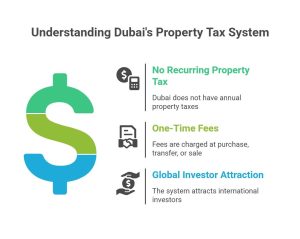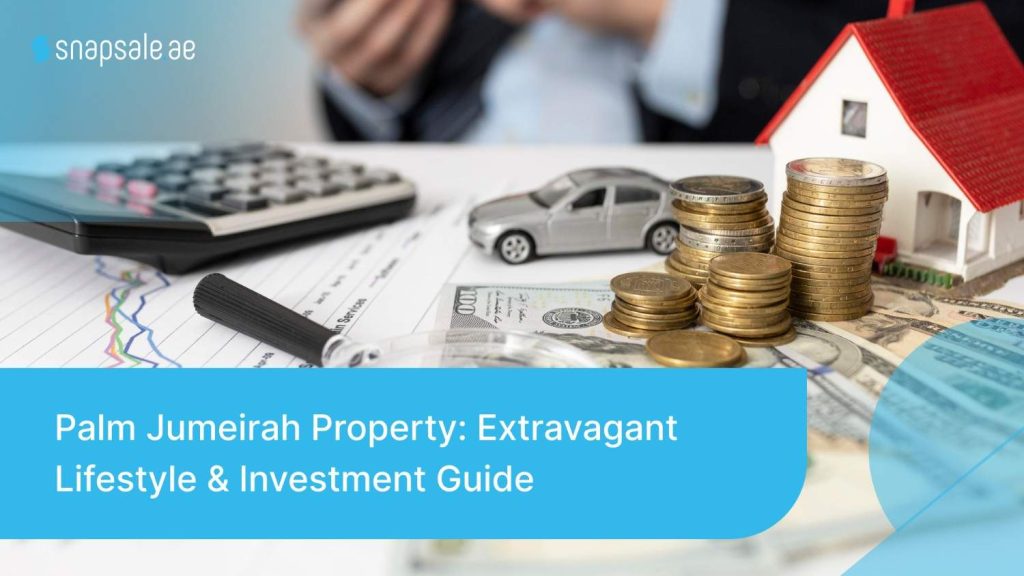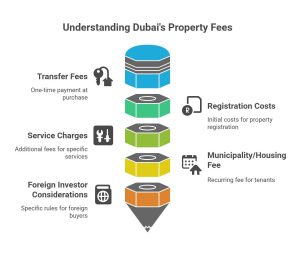With property comes the accompanying thought of taxes. Most countries around the world put a price tag on owning or selling their real estate, often in the form of recurring annual taxes. But Dubai takes a different approach altogether. There is no traditional property tax here. Instead, fees, charges, and one-time costs shape how much you actually spend.
If you are planning to buy, sell, or invest, you’ve probably wondered: What’s the real deal with property tax in Dubai? In this blog post, we discuss in detail what property tax in Dubai looks like and why the city’s system attracts so many global investors.
Is There Property Tax in Dubai?
That’s the biggest question that has most people curious. The short answer here, though, is that no, there is no recurring property tax in Dubai. Unlike many countries where homeowners write an annual check to the government just for holding property, Dubai doesn’t charge you a yearly tax on property ownership.
But that doesn’t mean it’s a completely tax-free ride. Instead of an ongoing property tax in Dubai, you will encounter different one-time fees at the time of purchase, transfer, or sale. We’ll be covering that in the upcoming section.

What Are the Property-Related Fees in Dubai?
When people Google real estate tax in Dubai, what they are usually asking about are the associated fees. While they aren’t technically taxes, they do impact your budget.
Dubai’s Approach vs. Global Property Taxes
In London, New York, or Sydney, property tax comes in annually and eats into your rental yields or personal income. In Dubai, it’s different. Instead of yearly payments, you deal with upfront transfer fees, registration costs, and specific charges tied to services. This makes the city attractive for investors seeking predictable, one-off payments rather than ongoing surprises.
Taxation on Property Sales & Income
This is the part where people usually get nervous. They start asking themselves, “Do I pay tax if I sell or rent out my property?”
Dubai doesn’t impose a capital gains tax on property sales. Rental income, however, might involve a housing fee for tenants. (More on this later.) Still, compared to other countries, the absence of a heavy tax on property in Dubai makes rental yields stand taller.
Costs for Foreign Investors
If you are buying from abroad, your fee structure remains nearly identical to that of local buyers. The city doesn’t add a premium just because you’re not a resident. What may change are administrative steps like approvals and financing rules, which we will be getting into later when we talk about foreign ownership.
How Much Are Dubai Property Transfer Fees?
This is the cost that grabs attention the most. Instead of a yearly real estate tax in Dubai, you will pay a property transfer fee at the time of purchase. This is charged by the Dubai Land Department (DLD) and applies whether you are a resident or a foreigner.
Residential vs. Commercial Property Fees
For both residential and commercial properties, the transfer fee works similarly. However, commercial properties might involve additional service charges depending on usage, zoning, or licensing. Residential buyers will mostly face the DLD transfer fee and standard registration charges.
Can Foreigners Buy Property in Dubai Without Taxes?
Yes, foreigners can buy property in Dubai without paying a traditional property tax. You’ll still face the transfer fee and other purchase-related charges, but these are one-time payments. Foreigners can also own property in designated freehold areas, which makes Dubai a rare market where overseas investors aren’t burdened with annual ownership taxes.
Municipality/Housing Fee Explained
Now, let’s talk about the closest thing Dubai has to a recurring property tax: the municipality or housing fee. This charge usually applies to tenants rather than owners, and it’s calculated based on the property’s rental value. If you are renting out a property, your tenant pays this through their utility bill.
Dubai Land Department: Breakdown of Fees
DLD plays a central role in handling most property-related charges. Aside from transfer fees, they also collect registration costs, trustee office fees, and valuation service charges. These ensure all property transactions are legally recognized and recorded.
If you are working with a real estate company like Snapsale, we handle these steps so you don’t have to manage all that paperwork on your own.
Are There Any Hidden Costs When Buying Property in Dubai?
Now, this is the part where buyers most often stumble: the extras. Even though there is no recurring property tax in Dubai, you might still run into expenses that don’t always show up in your initial budget calculations.
Tips for Minimizing Costs When Purchasing Property
- Work with a trusted real estate advisor who clarifies all charges upfront.
- Factor in service charges for building maintenance if you’re buying an apartment.
- Understand bank-related fees if you are financing your purchase.
By knowing these ahead of time, you prevent any seemingly hidden costs from catching you off guard. We can assist you with this, so you’d know exactly what to expect.
Advantages of Dubai’s Tax-Free Real Estate Market
Without a recurring property tax, Dubai positions itself as one of the most investor-friendly property markets in the world. Your returns aren’t eaten up by annual government demands. What happens instead is that your expenses are mostly upfront, making long-term ownership far more appealing.
This is one of the reasons why Dubai consistently attracts global investors, retirees, and first-time property buyers who are looking for growth without the drag of yearly taxes.
Frequently Asked Questions
Is there a property tax in Dubai?
No. Dubai doesn’t charge an annual property tax. But you will encounter one-time fees like transfer charges when you buy.
Do foreigners pay more property fees in Dubai?
No. Foreign investors pay the same transfer and registration fees as residents.
What about rental income? Does it get taxed?
There is no direct rental income tax. However, tenants usually pay a housing fee based on their lease value through utility bills.
Are there hidden costs I should be aware of?
Yes, beyond the main DLD transfer fee, you may encounter service charges, mortgage fees, and trustee office costs.
Why is Dubai attractive for investors if there’s no property tax?
Because owners don’t lose money every year to a recurring tax. The predictable, upfront cost structure makes investment planning easier and returns more attractive.




